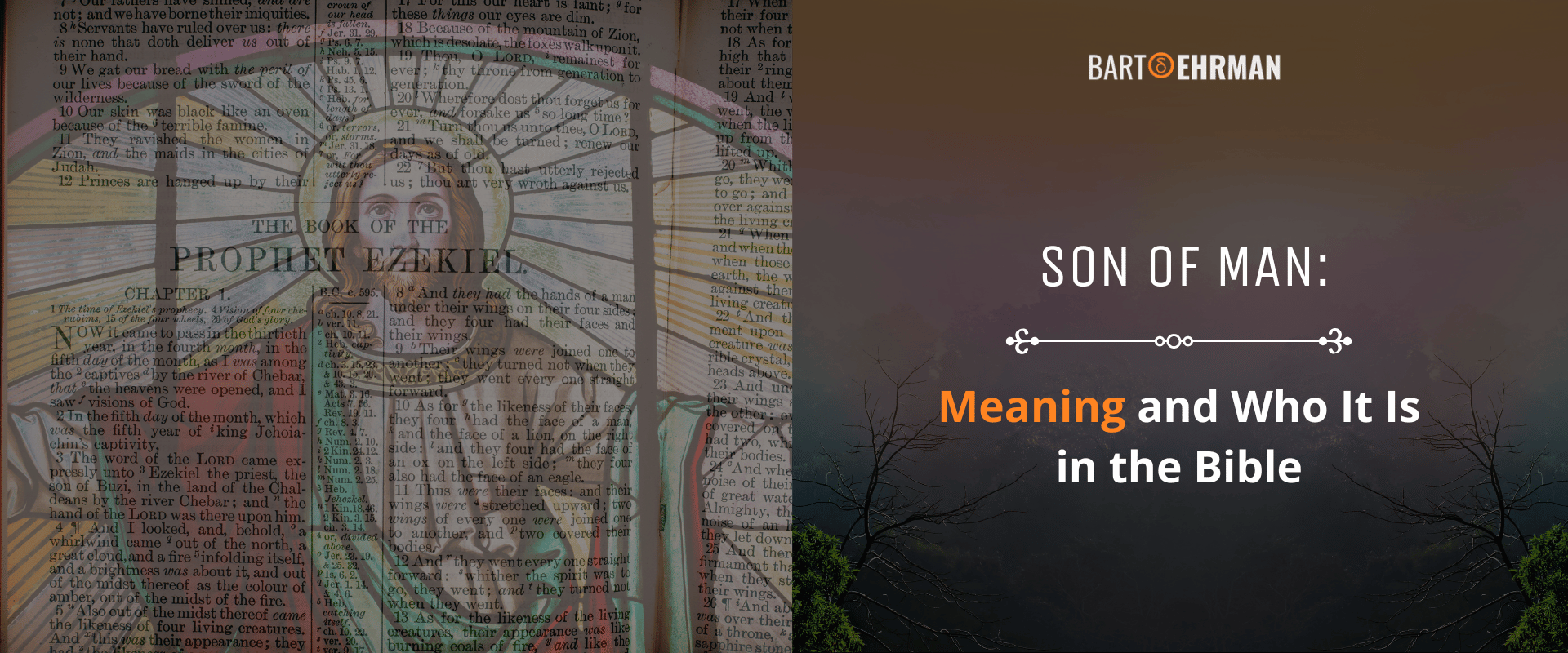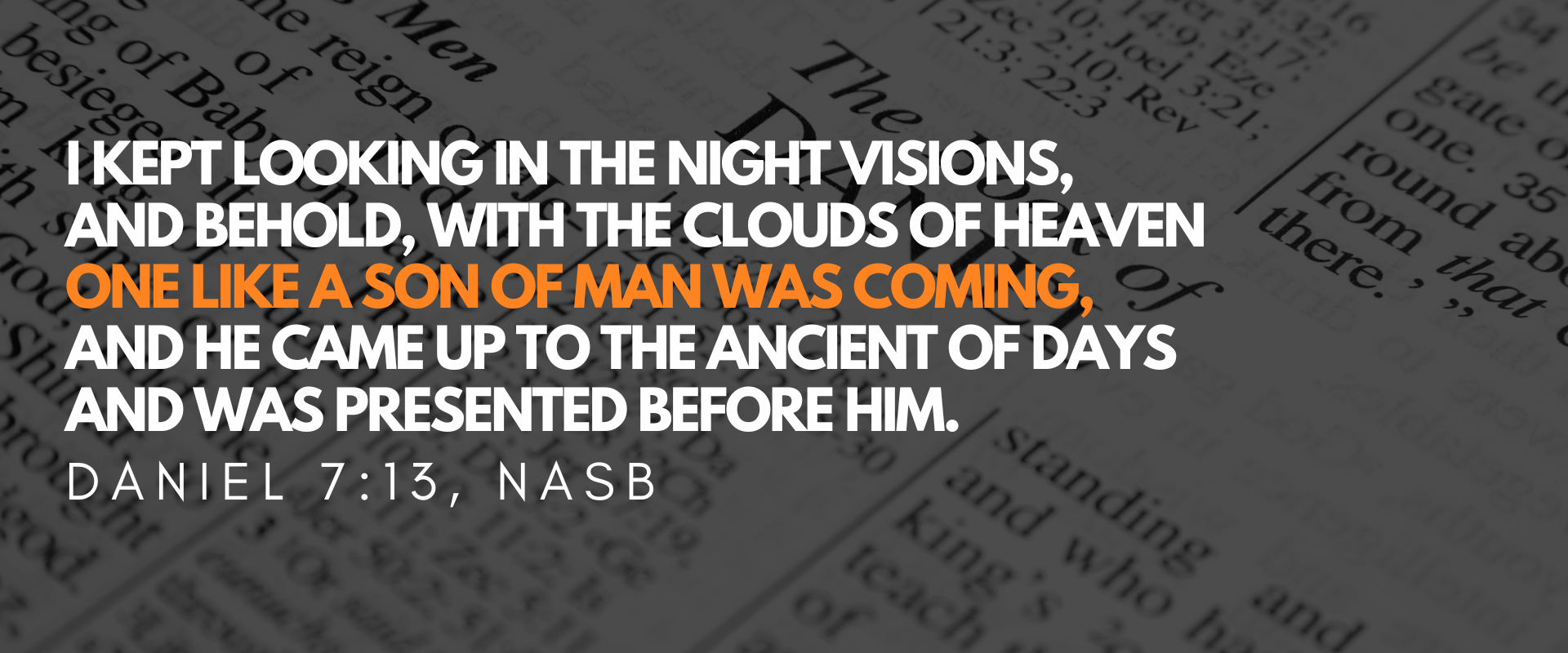Son of Man: Meaning and Who It Is in the Bible

Written by Joshua Schachterle, Ph.D
Author | Professor | Scholar
Author | Professor | BE Contributor
Verified! See our editorial guidelines
Verified! See our guidelines
Edited by Laura Robinson, Ph.D.
Date written: November 20th, 2024
Disclaimer: The views and opinions expressed in this article belong to the author and do not necessarily match my own. - Dr. Bart D. Ehrman
The phrase Son of Man is one of the most intriguing and multifaceted expressions in the Hebrew Bible and early Christian writings. Found in various contexts throughout Scripture, it has sparked centuries of theological reflection and debate.
In this article, I’ll examine the history and evolving interpretations of Son of Man, from its origins in the Hebrew Bible to its theological implications in early Christianity, providing insights into one of the most enigmatic phrases in religious thought.

Son of Man in the Hebrew Bible
What does “Son of Man” mean? The phrase Son of Man (Hebrew: ben-āḏām) can be found in the Hebrew Bible referring to several different categories of meaning. In the first category, it is used to contrast the nature and power of God with the humble state of human beings. For example, Numbers 23:19 says “God is not a man, that he should lie; neither the son of man, that he should repent.” Another example of this found in Psalms 8:4 asks God “What is man, that thou art mindful of him? and the son of man, that thou visitest him?” By the way, I’m using the KJV translation here since it translates ben-āḏām literally; the NRSV translates it as “mortal,” which is also accurate.
The second category is when God uses the phrase “Son of Man” merely to address a human being. The vast majority of this use is found in the book of Ezekiel when God speaks directly to the prophet Ezekiel. We see this, for example, in Ezekiel 2:1: “And he said unto me, ‘Son of man, stand upon thy feet, and I will speak unto thee.’”
The final category is found only in the book of Daniel where the Son of Man is an eschatological figure, a divine agent of God sent to end history and usher in God’s kingdom for Israel. Where do we find mentions of the Son of Man in Daniel? Daniel 7, for instance, describes a dream Daniel has in which four terrifying beasts, representing other powerful nations, persecute the people of Israel until they are submitted to God’s judgment. In one of the few passages of the Hebrew Bible written in Aramaic rather than Hebrew, Daniel 7:13–14 depicts God giving power to "one like a son of man (Aramaic: kibar 'anash)." The figure is portrayed like a human to show his superiority to the “beasts” of the other nations.
In other Jewish texts, we find more references to the concept of the Son of Man as an eschatological figure. In 1 Enoch, an apocryphal book (although the Ethiopian Orthodox Church considers it canonical), we see references to the Son of Man in a section known as the Similitudes. In this section, the Son of Man is characterized as a pre-existent, divinely sent judge, defender of righteousness, and ruler. In The International Standard Bible Encyclopedia, Geoffrey Bromiley writes that this depiction is so similar to some later conceptions of Jesus that many scholars suspect that it’s not original but rather a later Christian interpolation.
(Affiliate Disclaimer: We may earn commissions on products you purchase through this page at no additional cost to you. Thank you for supporting our site!)
In another non-canonical book, 4 Ezra, which was written sometime after 70 CE, we see a further reference to this apocalyptic Son of Man, when, in a dream, the narrator says
behold, a wind arose from the sea and stirred up all its waves.
And I looked, and behold, this wind made something like the figure of a man come up out of the heart of the sea. And I looked, and behold, that man flew with the clouds of heaven; and wherever he turned his face to look, everything under his gaze trembled.
In Two Gods in Heaven: Jewish Concepts of God in Antiquity, Peter Schäfer writes that this “figure of a man” is undoubtedly a reference to the “one like a son of man” in Daniel 7. Schäfer notes, though, that this son of man actually fights on God’s behalf. As God says in 4 Ezra 13:26, the Son of Man is
he whom the Most High has been keeping for many ages, who will himself deliver his creation; and he will direct those who are left.
The Son of Man in the New Testament
In the Gospels, only Jesus uses the phrase “Son of Man.” There is an ongoing scholarly debate, though, about whether or not Jesus really referred to himself in this way.
Bart Ehrman notes that Jesus in the Gospels uses the phrase in three different ways. First, to talk about his earthly ministry: “the Son of Man has nowhere to lay his head (Luke 9:58; Matt. 8:20).” Second, to talk about his suffering and death in the future: “the Son of Man must suffer many things and be rejected by the elders and the chief priests and the scribes and be killed, and after three days rise again (Mark 8:31; Luke 9:22).” Third, to refer to the cosmic judge, like the example in Daniel 7: “Whoever is ashamed of me and of my words in this adulterous and sinful generation, of him will the Son of Man be ashamed when he arrives from heaven in the presence of the holy angels (Mark 8:38).”
Ehrman asserts that Jesus, as an apocalyptic preacher, most likely didn’t see himself as the coming Son of Man. In The Son of Man Debate: A History and Evaluation, Delbert Burkett agrees, noting that “critical scholarship has increasingly tended to dissociate the Son of Man sayings from Jesus and attribute them to the early church.”
While the book of Hebrews uses the phrase Son of Man, it is only in quoting the verse from Psalms 8:4 I quoted above. However, the book of Revelation clearly draws its portrait of the Son of Man as Christ directly from Daniel 7:
… and in the midst of the lampstands I saw one like the Son of Man, clothed with a long robe and with a golden sash across his chest.
- Revelation 1:13
Then I looked, and there was a white cloud, and seated on the cloud was one like the Son of Man, with a golden crown on his head and a sharp sickle in his hand!
- Revelation 14:14
FREE COURSE!
WHY I AM NOT A CHRISTIAN
Raw, honest, and enlightening. Bart's story of why he deconverted from the Christian faith.
Over 6,000 enrolled!
Christology and the Son of Man
It seems clear, then, that whether or not Jesus himself used this phrase to refer to himself, the early church attributed it to him, believing he was the coming cosmic judge. Jesus’ sayings about the coming kingdom of God would probably have been interpreted in this light, with Jesus himself being the agent who would be “coming on the clouds of heaven.”
In Acts 7:55-56, for instance, just before he is stoned to death, we are told that Stephen
gazed into heaven and saw the glory of God and Jesus standing at the right hand of God. “Look,” he said, “I see the heavens opened and the Son of Man standing at the right hand of God!”
This is where we need to discuss the concept of Christology, which is theology about the nature and role of Jesus. We can examine how the phrase Son of Man is used in the Gospels and elsewhere in the New Testament to determine what the early church believed about Christology.
In Lord Jesus Christ: Devotion to Jesus in Earliest Christianity, Larry Hurtado writes that scholars through the years have generally come up with three types of explanations for early Christian uses of the Son of Man title for Jesus. The first says that Son of Man was a pre-Christian title for an eschatological figure, as in Daniel 7. Hurtado says that this is ultimately untenable because not only are there no other references in the Hebrew Bible to the Son of Man as a divine figure, but the two sources I mentioned above, 1 Enoch and 4 Ezra, may have been written in a post-Christian era. For the figure in Daniel, Son of Man was not really a title but rather a description.
The second scholarly explanation Hurtado describes says that the phrase “Son of Man” was coined as a title, either by Jesus himself or by early Christians. Hurtado thinks that while there are certainly references to Daniel in Mark 13:26 (“Then they will see ‘the Son of Man coming in clouds’ with great power and glory”) and its parallels, these texts were written so long after Jesus’ death that they may not reflect earliest Christian thought.
The third viewpoint outlined by Hurtado is that the Greek phrase “the Son of Man” (ton Huion tou anthrōpou) is not a reference to Daniel specifically, but rather a translation of an older Aramaic phrase which simply meant “human being.” We saw above how some of the Hebrew references to ben-āḏām meant exactly that. Hurtado disagrees, however, since Aramaic evidence from the Dead Sea Scrolls fails to provide examples of this use.
Hurtado’s own explanation is that the phrase “The Son of Man” with emphasis on the definite article “the,” indicates two things about early Christology. First, it shows that Jesus was believed to have used the phrase for himself. For this reason, no other writer refers to him as “The Son of Man” except when referring to Jesus’ own words. Second, it shows that the phrase was not a title as such, but rather designated that Jesus was THE human being, perhaps the perfect example of a human being, while also being God’s divine Son.

Conclusion
With the hindsight of 2,000 years of Christian history, it may seem ordinary to call Jesus the Son of Man. However, this phrase has a complicated history and remains somewhat ambiguous. What does Son of Man mean?
In the Hebrew Bible, the phrase is used to refer to human beings in contrast to the divine, to address a specific person from the divine viewpoint as in Ezekiel, and to refer to a human-like eschatological figure meant to usher in God’s judgment and rule. Apocalyptic Jewish texts such as 1 Enoch and 4 Ezra use it in the third way, although some scholars think that the references were at least influenced by Christianity.
In the New Testament, Jesus uses the phrase, changed from “one like a son of man” to “the Son of Man” to refer to his own ministry, to refer to his future agony, death, and resurrection, and finally to refer to an eschatological figure as outlined in Daniel. The book of Revelation also refers to the Danielic “one like a Son of Man” to talk about an exalted Jesus.
While scholars have explained this phrase in a variety of ways, Larry Hurtado thinks that the most likely explanation for its use is that early Christians did not consider it a title but rather a description of Jesus: he was “THE Son of Man,” the perfect example of a human being as well as the divine Son of God.
FREE COURSE!
WHY I AM NOT A CHRISTIAN
Raw, honest, and enlightening. Bart's story of why he deconverted from the Christian faith.
Over 6,000 enrolled!
